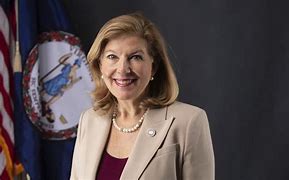
by James A. Bacon
Governor Glenn Youngkin made a national name for himself by standing up for parents’ rights in public education. His administration has engaged in bruising battles over transgender policy, critical race theory, and educational standards in K-12 schools. His approach to higher-ed issues has been far less contentious. Other than fighting for a year-long freeze in college tuition & fees, which he won, Youngkin’s higher-ed policy has generated few headlines.
That doesn’t mean Youngkin has neglected higher education. Rather than take a confrontational approach, such as seen in Florida and North Carolina, the governor is trying to work within the system. In a keynote address delivered to the American Council of Trustees and Alumni (ACTA) Friday, Amy Guidera, Virginia’s Secretary of Education, described the administration’s philosophy.
The purpose of higher education is to equip students to become more productive and constructive members of society, Guidera said. Allowing free speech, free inquiry and intellectual diversity is critical to achieving the larger goal. It is important, she said, for students to “be confronted with ideas and beliefs [they] have never encountered before.”
Rather than enact legislation, Youngkin has chosen to work with the Council of Presidents, comprised of the presidents of Virginia’s public colleges and universities. He has met with the Council every quarter, something that no previous governor did, Guidera said. In those meetings he has been clear about his support for “a culture of free expression.”
A positive outcome of those meetings was a statement by Virginia’s university presidents in support of both free speech and intellectual diversity. “As presidents of Virginia’s public colleges and universities, we unequivocally support free expression and viewpoint diversity on our campuses,” said the statement. That statement created a yardstick for measuring the policies and practices of individual institutions.
Voicing support for free speech is not the same as enforcing the principle in the face of intolerant campus radicals — as the shout-down of a right-to-life group at Virginia Commonwealth University last week vividly demonstrated. VCU campus police intervened only when the protest started to turn violent. Effectively, the protesters canceled the event.
Universities need to do more than pass resolutions. Guidera mentioned several concrete approaches to explore: highlighting free speech in student orientations, sponsoring events that feature a wider range of viewpoints, and encouraging viewpoint diversity in hiring.
Guidera also hopes to advance free speech and viewpoint diversity through the appointment of individuals sharing those goals to boards of visitors across the state. The administration partnered with free-speech organizations ACTA and the Foundation for Individual Rights and Expression (FIRE) to provide training sessions for newly appointed board members. The administration is also reaching out to, or partnering with like-minded national organizations such as the Heterodox Academy and the Constructive Dialogue Institute.
The challenge of building “a culture of freedom and open discourse” begins even before students get to college: students need to gain a strong grounding in civics in K-12. Giving them that grounding has been a priority for the administration, which has expended considerable political capital revamping Virginia’s history/civics Standards of Learning.
The administration’s approach to higher education fits into Youngkin’s broad aim of making Virginia the best place in America to live, work and raise a family, Guidera said. One of Virginia’s greatest attributes has been its world-class public schools and public universities. To maintain that reputation, she said, Virginia educators need to teach students “how to think, not what to think.”
“Free speech and open inquiry,” Guidera concluded, “are non-negotiable.”

Leave a Reply
You must be logged in to post a comment.